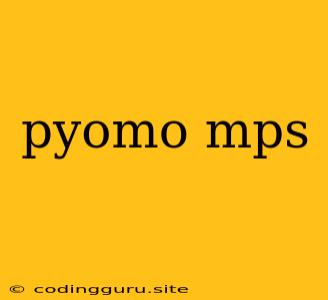Pyomo: A Powerful Tool for Mathematical Programming
Pyomo is a powerful Python-based modeling language for mathematical programming. It allows you to express complex optimization problems in a concise and readable way, making it easier to solve them using a variety of solvers. One of the common formats for representing optimization problems is the MPS (Mathematical Programming System) format.
What is MPS format?
MPS is a standard file format for linear programming problems. It was developed by IBM and is widely used in the optimization community. The MPS format is a text-based format that specifies the objective function, constraints, and variables of the problem.
How can Pyomo be used to generate MPS files?
Pyomo provides a simple way to generate MPS files from your optimization models. Here's a step-by-step guide:
-
Define your optimization model in Pyomo:
from pyomo.environ import * model = ConcreteModel() # Define variables model.x = Var(range(3), domain=NonNegativeReals) # Define objective function model.obj = Objective(expr=sum(model.x[i] for i in range(3))) # Define constraints model.constraint1 = Constraint(expr=sum(model.x[i] for i in i in range(3)) <= 10) model.constraint2 = Constraint(expr=model.x[0] + 2 * model.x[1] >= 5) -
Generate the MPS file:
from pyomo.environ import * from pyomo.solvers import * # Create an MPS writer writer = MPSWriter(model) # Write the model to an MPS file writer.write('my_model.mps')
Why use MPS format with Pyomo?
There are several reasons why generating MPS files using Pyomo can be beneficial:
- Interoperability: MPS is a widely supported format, allowing you to use a variety of solvers that accept MPS input.
- Efficiency: Some solvers can be more efficient when working with MPS files directly.
- Flexibility: MPS format can be easily manipulated and modified using text editors or other tools.
- Standardization: Using a standard format like MPS ensures compatibility across different platforms and software packages.
Example:
Let's consider a simple example of a transportation problem. We have two warehouses and three stores. We want to find the optimal transportation plan to minimize the total transportation cost.
from pyomo.environ import *
# Define the model
model = ConcreteModel()
# Define the sets
model.warehouses = Set(initialize=['Warehouse1', 'Warehouse2'])
model.stores = Set(initialize=['Store1', 'Store2', 'Store3'])
# Define the parameters
model.supply = Param(model.warehouses, initialize={'Warehouse1': 100, 'Warehouse2': 150})
model.demand = Param(model.stores, initialize={'Store1': 50, 'Store2': 80, 'Store3': 70})
model.cost = Param(model.warehouses, model.stores, initialize={
('Warehouse1', 'Store1'): 10,
('Warehouse1', 'Store2'): 12,
('Warehouse1', 'Store3'): 15,
('Warehouse2', 'Store1'): 11,
('Warehouse2', 'Store2'): 9,
('Warehouse2', 'Store3'): 13
})
# Define the variables
model.transport = Var(model.warehouses, model.stores, domain=NonNegativeReals)
# Define the objective function
model.total_cost = Objective(expr=sum(model.cost[w, s] * model.transport[w, s] for w in model.warehouses for s in model.stores))
# Define the constraints
model.supply_constraint = Constraint(model.warehouses, rule=lambda model, w: sum(model.transport[w, s] for s in model.stores) <= model.supply[w])
model.demand_constraint = Constraint(model.stores, rule=lambda model, s: sum(model.transport[w, s] for w in model.warehouses) == model.demand[s])
# Generate the MPS file
writer = MPSWriter(model)
writer.write('transportation_problem.mps')
This code defines the model, sets, parameters, variables, objective function, and constraints. It then uses the MPSWriter to generate the MPS file transportation_problem.mps.
Conclusion
Pyomo provides a powerful and flexible way to model optimization problems. Generating MPS files allows you to leverage a wide range of solvers and take advantage of their specific capabilities. By using Pyomo with the MPS format, you can easily solve complex optimization problems and obtain optimal solutions for your applications.
